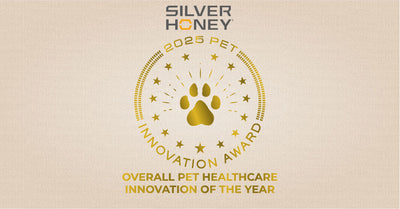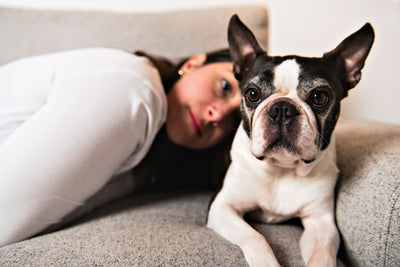Ugh, that biting, scratching and licking is driving me crazy, and my dog seems so uncomfortable! He’s got a gross red area and he won’t leave it alone. He was fine over the weekend, what is going on?
Sounds like your pup has a hot spot. Hot spots can seem to appear suddenly out of nowhere and can spread frustratingly quickly. Speaking of frustrating, they trigger scratching, licking and chewing which results in more inflammation and potential infection, making them itch even more – its an ugly cycle! The good news is they are treatable.
Wait, what the heck is a hot spot?
Hot Spots are also called acute moist dermatitis, which are localized areas of skin inflammation and bacterial infection. They are typically well-defined areas of redness, swelling and hair loss. There may be a discharge of fluid, which can cause crusting and matting of the surrounding hair. While they can occur just about anywhere on a pet's body, they are most common on the head, legs and hips – and unfortunately they are painful and itchy. Some breeds like German Shepherds, Labradors, Rottweilers, Golden Retrievers and some long hair cat breeds can be more prone to hot spots due to their thicker coats – and heat and humidity help promote them, now is the perfect time of year to be on the lookout for these problem areas.

Why do they happen?
Any condition that makes your dog feel itchy has the potential to turn into a hot spot. With a combination of the trauma of the area caused by the itching, the presence of bacteria, and the addition of warm temperatures and moisture, you’ve got a perfect recipe for a hot spot. Some of the common causes include flea allergies, food allergies, ear or skin infections, contact irritants, excessive licking due to stress or boredom, and moisture that gets trapped in the coat from swimming or bathing.
So what do I do for poor itchy Buddy?
Don’t ignore the area hoping it will resolve on its own. Delaying treatment will just make the problem worse. You should visit your Veterinarian to make sure Buddy or Bubbles doesn’t have a chronic underlying condition like parasites.
Clip the hair around the area to prevent matting, and gently clean the area with warm water and pat it dry. Apply a strong but gentle antimicrobial like Silver Honey® Hot Spot & Wound Care, which combines natural Manuka Honey and MicroSilver BG® for rapid healing. You want to kill the bacteria while soothing the skin to discourage further licking and scratching and allow new tissue growth. In most cases, a hot spot can be resolved in as little as 7 days.

Is there any way to prevent them from happening?
Once your Vet has helped you identify the underlying cause, you can address any necessary management of allergies or parasite prevention. Beyond that, good hygiene and routine grooming is important. If your pup loves swimming and splashing in lakes, streams and puddles (and who doesn’t love to cool off that way in warm weather?), be sure to dry their coats thoroughly after the activity. Cats clean themselves most of the time, but you can help by keeping a watchful eye for small cuts or scrapes they might start compulsively licking. Treat these with Silver Honey® and monitor closely as it heals.
Adding nutritional supplements to their diet, like The Missing Link® , will add a healthy balance of Omega fatty acids that will help promote healthy skin and coat and provides anti-inflammatory properties to help make your dog less susceptible to allergies and itches.
If your dog or cat is licking due to stress or boredom, increasing play time and daily exercise is a great way to fix this problem. Keeping them mentally stimulated and physically active gives them less time to be bored and stressed, and will keep them – and you – healthier too!
Since hot spots can be a recurring problem, be prepared. Build a first aid kit to keep on hand for when issues arise. Include a clean comb, clean wash cloth, small snippers for matted fur, and an antimicrobial like Silver Honey®. That way you can treat the issue immediately, saving you and your pet from the frustration and pain of constant itching and infection.





